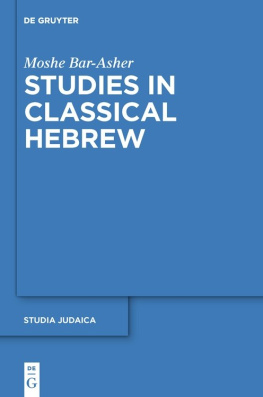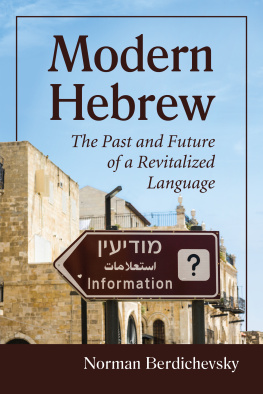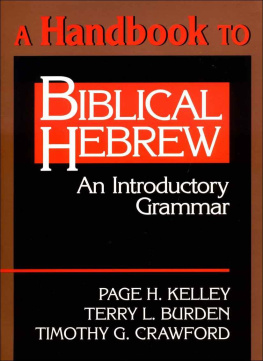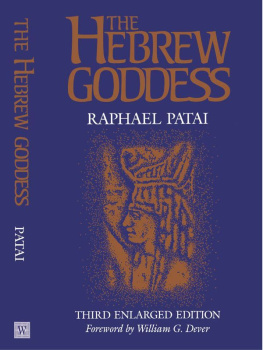
The Story of Hebrew
LIBRARY OF JEWISH IDEAS
Cosponsored by the Tikvah Fund

The series presents engaging and authoritative treatments of core Jewish concepts in a form appealing to general readers who are curious about Jewish treatments of key areas of human thought and experience.
The Story of Hebrew

LEWIS GLINERT
Princeton University Press
Princeton and Oxford
Copyright 2017 by Princeton University Press
Published by Princeton University Press, 41 William Street,
Princeton, New Jersey 08540
In the United Kingdom: Princeton University Press, 6 Oxford Street,
Woodstock, Oxfordshire OX20 1TR
press.princeton.edu
Jacket calligraphy by Michel dAnastasio; jacket design by Faceout Studio
All Rights Reserved
Library of Congress Cataloging-in-Publication Data
Names: Glinert, Lewis, author.
Title: The story of Hebrew / Lewis Glinert.
Description: Princeton; Oxford: Princeton University Press, [2016] | Series: Library of Jewish ideas | Includes bibliographical references and index. | This book tells two stories: first, how Hebrew has been used in Jewish life, from the Israelites to the ancient Rabbis and across 2,000 years of nurture, abandonment, and renewal, eventually given up by many for dead but improbably rescued to become the everyday language of modern Israel. Second, it tells the story of how Jewsand Christianshave perceived Hebrew, and invested it with a symbolic power far beyond normal languageECIP introduction.
Identifiers: LCCN 2016022084 | ISBN 9780691153292 (hardcover : alk. paper) Subjects: LCSH: Hebrew languageHistory. | Hebrew languageRevival. | Hebrew languageUsage.
Classification: LCC PJ4545 .G55 2016 | DDC 492.4/09dc23
LC record available at https://lccn.loc.gov/2016022084
British Library Cataloging-in-Publication Data is available
Publication of this book has been aided by the Tikvah Fund
This book has been composed in Gentium
Printed on acid-free paper.
Printed in the United States of America
10 9 8 7 6 5 4 3 2 1
For Joan
Contents
Figures
The Story of Hebrew
Introduction
This book tells two stories: first, how Hebrew has been used in Jewish life, from the Israelites to the ancient Rabbis and across two thousand years of nurture, abandonment, and renewal, eventually given up by many for dead but improbably rescued to become the everyday language of modern Israel. Second, it tells the story of how Jewsand Christianshave conceived of Hebrew, and invested it with a symbolic power far beyond normal language.
As befits any stirring and suspenseful tale, we will follow it as it unfolded. But this book is more than an exciting story and certainly more than an exercise in historical linguistics. It will examine the history of Hebrew using ethnographic, sociolinguistic, and philosophical approaches. What purpose did Hebrew serve? How has it figured in the popular and learned imagination? How did Hebrew figure into Jews sense of identity, and how did that relationship change with the advent of Zionism? What kept Hebrew from dying out completely, and what made its near-impossible revival possible? And what can its remarkable story teach about the workings of human language in general?
In short, this is not so much a book about what Hebrew words mean as about what the Hebrew language has meant to the people who have possessed it. To explore this topic, we will examine what they wrote about Hebrew and the various ways in which they used it. We will also look beyond the words and grammatical structures to communication styles and to the para-language of scripts, fonts, spellings, formats. In many cultures, people see script and spelling as inseparable from the language; in others, writing is in itself sacred. No account of language can ignore the pull of para-language.
Jews have done a great deal of thinking about Hebrewmore, perhaps, than most peoples have thought about their languageand for a good reason. For much of their history, Hebrew was not a mother tongue to be spoken naturally. Rather, Jews kept it alive by raising their young men to study and ponder Hebrew texts. This was true for a period of some two thousand years, stretching from the close of the biblical era down to the early twentieth century and the restoration of spoken Hebrew.
But how did Hebrew mean so much to them and how could Jews keep it alive so well that, after two millennia, it could be restored almost overnight? The restoration of Hebrew, first as a mother tongue and then as an all-purpose language of a modern Jewish state, was an act without precedent in linguistic and sociopolitical history. I seek to explain this revival in those terms, but also by exploring the ideas, emotions, and sensibilities that made it possible.
The engine of Jewish existence for those two millennia was the study of the Torah, Judaisms sacred texts: Bible, Midrash, Talmud, and the teachings springing from them. In the words of Psalm 119:97, How dearly I love Thy Torah; I speak about it all day long. Jews intensively studied the wording of these texts for every conceivable nuance. The loss of their Temple, their liberty, and then their homeland in the first centuries of the Common Era imperiled but ultimately strengthened knowledge of the Torah and the Hebrew language as a core component of Jewish identity.
Jews, of course, were not the only people who believed the Hebrew Bible to be sacred. Not surprisingly, at various times, significant , the High Middle Ages brought a succession of intellectual upheavals and religious crises to Catholic Europe that formed a potent brew of curiosity, envy, and dark suspicion of the Jews command of Hebrew and of the biblical text.
Two religious goals dominated Christian thinking about the Hebrew language: spiritual renewal and the conversion of the Jews. With the Renaissance, the Reformation, and the Counter-Reformation, this interest became intense, and intense conflict also ensued. The focus varied wildly: Kabbalah-mania, Talmud-phobia, vernacular Bible study, millennialism, rabbinic political thought, Puritan dreams of a New Israel. Religion aside, many minds in the Christian Renaissance also found philosophical and political significance in the Hebrew language and its literature.
By early modern times, Christian enthusiasm for Hebrew had achieved its goals or changed tack. For Jews, however, the Hebrew narrative went on and soon took extraordinary turns: not as the language of religion but as the language of national identity.
Almost throughout their history, Jews have taken for granted that they are a people as well as a religion. This national consciousness, rooted in biblical memory, held firm across the centuries of Diaspora and provided a cogent and inspirational rationale for modern Zionism. The Hebrew language and its literature have been critical elements in this national identity, often as a counterforce to rival cultures and languagesGreek in the ancient world, Arabic in the Middle Ages, European vernaculars in the modern era, and now global English. Pride in the force and grace of the language underpinned the secular Hebrew literature of the medieval Diaspora and the modern revival as much as religious commitment has underpinned Hebrews sacred literature.
Next page











